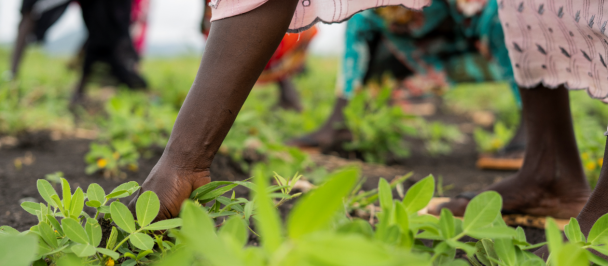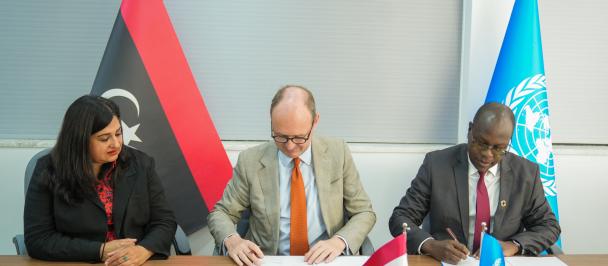Rapid assessment warns that Egypt may lose up to 5 years in human development
Egypt faces mounting socio-economic strain from the Gaza war, says UNDP
May 8, 2024

Cairo, Egypt - The Egyptian economy, which relies heavily on tourism, remittances, Suez Canal revenues, foreign debt, and capital flows, is experiencing the repercussions of the Gaza war in various areas, straining Egypt's economic reform and development trajectory, according to a new rapid assessment released today by the United Nations Development Programme (UNDP).
The new analysis titled "Potential Socio-Economic Impact of the Gaza War on Egypt: A Rapid Assessment” sheds light on the multiple impacts of the ongoing Gaza war on the Egyptian economy and society and provides insights for policy makers and stakeholders to mitigate the risks. The assessment estimates the impacts with projections for low-intensity (six-months), medium-intensity (nine-months) and high-intensity (one-year) scenarios.
The authors estimate that Egypt’s GDP would be lower by 2.6 percent than the business-as-usual levels in the fiscal year 2023–24 and 1.3 percent in the fiscal year 2024–25 in a medium-intensity scenario; and by 3.0 percent in fiscal year 2023–24 and 2.6 percent in fiscal year 2024–25 in a high-intensity scenario. Unemployment rate is expected to increase due to the Gaza war, with lasting effects, from 7.8 percent to 8.7 percent in the medium-intensity scenario and 9.1 percent in the high-intensity scenario.
"The Gaza war is putting Egypt's resilience and its ability to deal with these turbulent times to test, particularly challenges associated with external shocks,” said Alessandro Fracassetti, UNDP Resident Representative in Egypt, emphasizing the urgency of addressing the socio-economic impact of the Gaza war. “This study underscores the urgent need for coordinated efforts to alleviate the adverse effects on the Egyptian economy and ensure a sustainable recovery."
The study highlights the profound economic challenges facing Egypt where the country’s key sources of revenue, tourism and the Suez Canal, have been hit hard as a result of the attacks in the Red Sea and ensuing repercussions on maritime transit, exacerbating the economic distresses, and necessitating swift recovery measures.
UNDP estimates the decline in tourism and the Suez Canal revenues in the two fiscal years 2023-24 and 2024-25 to be around $9.9 billion in a medium intensity scenario, and $13.7 billion if the war intensifies with the involvement of other regional actors (high intensity).
In addition, the projections indicate possible setbacks in Egypt's Human Development Index (HDI), which would fall back to the levels of previous years and reverse progress made in the post-COVID period. The simulations show that the HDI would fall from 0.728 in 2022 to 0.726 in the low and medium-intensity scenarios while in the high intensity scenario, it would decrease to 0.720, pushing human development in Egypt back to the 2021 level in the first two scenarios and to the level observed in 2018 in the third scenario, representing a loss of up to five years in human development gains.
The assessment highlights that there is an urgent need for targeted measures and policy reforms to ensure Egypt's socio-economic stability. To restore macro-financial stability, the Egyptian government has already signed several new agreements that have increased the inflow of foreign currency and capital. Along with the implementation of prudent macroeconomic policies and recovery measures, the government is working to mitigate the problems and smooth-out the negative impact of the Gaza war. The study proposes policy recommendations that include strengthening mechanisms to support vulnerable populations, implementing labour market reforms and promoting regional economic cooperation.
The full report will be available online on May 15, 2024. For the executive summary, available now on: https://go.undp.org/ZGe
For more information and to arrange interviews, please contact:
UNDP | Fatma Elzahraa Yassin | Communication Lead | UNDP in Egypt | fatma.yassin@undp.org
------
Note to Editors
A team of economists, comprising experts from UNDP within the region and beyond, were involved in the preparation of this study. The CGE modelling exercise was conducted by Dr. City El Deep Radwan and Dr. Mariam Raouf. External peer review was provided by Dr. Mahmoud Mohieldin, Dr. Alia El Mahdy, and Dr. Sara El Khishin.
An early draft of the rapid assessment has been validated by key stakeholders from the Government of Egypt and various research institutions.

 Locations
Locations



